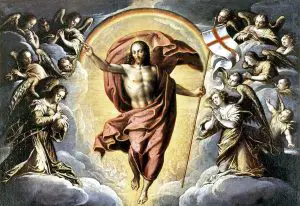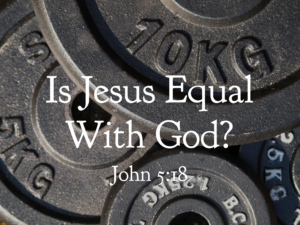The letter to the Hebrews was written to Hellenized Jews who had come to faith in Christ, but were in danger of returning to the Law. It’s possible that an esteem for angels as mediators of the first covenant[1] is what motivated the author to pen two chapters presenting Jesus as being “better than” the heavenly beings. Some posit that the writer based his claims of Jesus’ superiority to angels on a belief that he is God. But is this what the author was trying to convey? What would first century Jews have understood the author to mean? Let’s examine the text to find out.
Jesus is superior to angels because he inherited a more excellent name
In a previous post, we examined the author’s first argument for why Jesus ranks higher than the angels:
Hebrews 1:3b-4 (NASB) When He [Jesus] had made purification of sins, He sat down at the right hand of the Majesty on high, 4 having become as much better than the angels, as He has inherited a more excellent name than they. (emphasis added)
In brief, we noted that Jesus became better than the angels. In other words, he wasn’t always superior to them. Jesus became superior to them when God raised him from the dead, seated him at His right hand, and appointed him heir of all things.[2] Part of Jesus’ inheritance included a name (often synonymous with one’s authority) that is more excellent than that of the angels. Indeed, he was given a name greater than any other name. [3] If Jesus is God, this passage makes no sense as he would eternally be greater than the angels, and his name inherently more glorious and powerful.
How then did the human Jesus warrant a higher rank than the angels? The context provides the answer:
Hebrews 2:9 (NASB) But we do see Him who was made for a little while lower than the angels, namely, Jesus, because of the suffering of death crowned with glory and honor, so that by the grace of God He might taste death for everyone. (emphasis added)
The human Messiah was exalted above the angels because he chose to humble himself and obey the will of God, even though it meant death by crucifixion. For this reason, he was crowned with glory and honor, not because he is deity.
Jesus is superior to angels because he is God’s royal Son
 In the ensuing verses, the author continues to build his case for Jesus’ supremacy by quoting Old Testament passages that relate to sonship:
In the ensuing verses, the author continues to build his case for Jesus’ supremacy by quoting Old Testament passages that relate to sonship:
Hebrews 1:5 (NASB) For to which of the angels did He ever say, “YOU ARE MY SON, TODAY I HAVE BEGOTTEN YOU”? And again, “I WILL BE A FATHER TO HIM AND HE SHALL BE A SON TO ME”? (emphasis added)
Here, the author quotes from a psalm that is attributed to King David:[4]
Psalm 2:6-8 (NASB) [God speaking] “But as for Me, I have installed My King upon Zion, My holy mountain.” 7 [The king speaking] “I will surely tell of the decree of the LORD: He said to Me, ‘You are My Son, Today I have begotten You. 8 [God speaking] ‘Ask of Me, and I will surely give the nations as Your inheritance, and the very ends of the earth as Your possession. (emphasis added)
On the day that David was made king, God said, “You are My Son, today I have begotten you.” Meaning, as John Calvin wrote in his commentary, that “David was begotten by God when the choice of him to be king was clearly manifested.”[5] David would be God’s son, ruling over Israel on His behalf. Note in verse 6 that God said, “I have installed My king…” The ascension to the throne was all God’s doing, not David’s.
Prophetically Psalm 2 also looked forward to the day when God would install the Messiah on the throne of Zion in the future kingdom and subsequently give him the nations as his inheritance.[6] The apostle Paul tied the fulfillment of this prophecy to Jesus’ resurrection.[7] At the right time, the royal Son will rule the kingdom on God’s behalf.[8] And like King David’s ascension, Jesus’ rise to the throne was all God’s doing.[9]
How is Jesus better than the angels if they, too, are called sons of God?
Scripture also refers to angelic beings as sons of God.[10] How then is Jesus superior to these other sons? The answer is found in the author’s rhetorical question, “…to which of the angels did God ever say you are My Son, today I have begotten you?” According to the royal theme of Psalm 2, which the author applies to Jesus, he is the greater son because God gave him the throne and the very ends of the earth as his possession. What’s more, the author of Hebrews tells us in the same context that God has not subjected the world to come to the angels, but to Jesus:
Hebrews 2:5 and 8 (NASB) For He did not subject to angels the world to come, concerning which we are speaking… 8 YOU HAVE PUT ALL THINGS IN SUBJECTION UNDER HIS FEET.” For in subjecting all things to him, He left nothing that is not subject to him. But now we do not yet see all things subjected to him. (emphasis added)
Even the angels, as glorious and as powerful as they are, have been subjected to the Messiah.
Jesus is greater than the angels because they worship him
Jesus is also greater than the angels because he is the recipient of their worship:
Hebrews 1:6-7 (NASB) And when He [God] again brings the firstborn into the world, He says, “AND LET ALL THE ANGELS OF GOD WORSHIP HIM.” 7 And of the angels He says, “WHO MAKES HIS ANGELS WINDS, AND HIS MINISTERS A FLAME OF FIRE.” (emphasis added)
According to the context, the phrase, into the world, refers to the world to come, that is, the kingdom of God.[11] Jesus has the distinction of being the firstborn of God in that he is the first to be raised from the dead and given immortality.[12] It is this glorified and exalted human that God commands His angels to worship.
 In Hebrews 1:6, the author is quoting Psalm 97:7 when he says, “and let all the angels of God worship him.” The statement is in the imperative, meaning, it is a command. The word worship is proskuneô in the Greek. It comes from two words: pros, which denotes motion toward, and kuneô, which literally means to kiss. By extension, proskuneô means to bow down; do reverence; prostrate oneself in homage; to adore.[13] Proskuneô is an act that can be done in deference to both God and man.[14]
In Hebrews 1:6, the author is quoting Psalm 97:7 when he says, “and let all the angels of God worship him.” The statement is in the imperative, meaning, it is a command. The word worship is proskuneô in the Greek. It comes from two words: pros, which denotes motion toward, and kuneô, which literally means to kiss. By extension, proskuneô means to bow down; do reverence; prostrate oneself in homage; to adore.[13] Proskuneô is an act that can be done in deference to both God and man.[14]
Some view the angels’ worship of Jesus as proof that he is God. If Jesus is deity, however, God would not have to command the angels to worship him as they would do so instinctively. But because Jesus is a man who was once lower in rank,[15] God must command the heavenly beings to pay homage to him after he has been exalted to God’s right hand and given governance of the coming kingdom. Many will quickly point to the next verse, however, to prove Jesus is God:
Hebrews 1:8 (NASB) But of the Son He says, “YOUR THRONE, O GOD, IS FOREVER AND EVER, AND THE RIGHTEOUS SCEPTER IS THE SCEPTER OF HIS KINGDOM. (emphasis added)
This verse is a good example of why it is essential to examine passages in the context in which they appear. Failure to do so can result in a faulty exegesis, as is often the case with this verse. Here, the author quotes Psalm 45 for its dual fulfillment. The psalm was written in celebration of a king’s, possibly Solomon’s, wedding. In verse one, the psalmist addresses the king, “My heart overflows with a good theme; I address my verses to the King…” He continues his address to the king:
Psalm 45:6 (NASB) Your throne, O God, is forever and ever; A scepter of uprightness is the scepter of Your kingdom. (emphasis added)
We may be surprised, considering our Westernized view of God, that the psalmist called the king of Israel God. Jews of antiquity, however, would have considered it a normal occurrence, as we shall soon see. The word God here is elohim in the Hebrew, and it can be translated as god, judge, ruler, or mighty one.[16] It can be a designation for God, but it can also used for other gods, angels, and men. In Psalm 45, the king of Israel was appointed by God to rule on His behalf and was thus called elohim or god. Unfortunately, the translators chose to capitalize the word giving the English reader the impression that the text is speaking of the highest God. However, the Hebrew script, which uses letters of uniform size, bears no such distinction.
Other Men who were called God
Psalm 45 isn’t the only time a human being is called God. Other examples can be found in Exodus:
Exodus 4:16 (NASB) “Moreover, he [Aaron] shall speak for you [Moses] to the people; and he will be as a mouth for you and you will be as God to him. (emphasis added)
Exodus 7:1 (NASB) Then the LORD said to Moses, “See, I make you as God to Pharaoh, and your brother Aaron shall be your prophet. (emphasis added)
 Again, the word God in both passages is elohim. God told Moses that he would be God to Aaron and Pharaoh. In context, the traditional Jewish mindset would have understood elohim to refer to an agent sent by God to carry out a divine mission. Moses would be a god or a mighty one (elohim) representing the Almighty. This is often referred to as the law or principle of agency. Because Moses was being sent by God to act on His behalf, he would have been considered as God himself. The Encyclopedia of Jewish Religion explains agency this way:
Again, the word God in both passages is elohim. God told Moses that he would be God to Aaron and Pharaoh. In context, the traditional Jewish mindset would have understood elohim to refer to an agent sent by God to carry out a divine mission. Moses would be a god or a mighty one (elohim) representing the Almighty. This is often referred to as the law or principle of agency. Because Moses was being sent by God to act on His behalf, he would have been considered as God himself. The Encyclopedia of Jewish Religion explains agency this way:
The main point of the Jewish law of agency is expressed in the dictum, “a person’s agent is regarded as the person himself.” Therefore, any act committed by a duly appointed agent is regarded as having been committed by the principal…[17] (emphasis added)
Another example of men who were called gods is found in Psalm 82:
Psalm 82:1 and 6 (NASB) God takes His stand in His own congregation; He judges in the midst of the rulers [elohim]…. 6 I said, “You are gods [elohim], and all of you are sons of the Most High. (emphasis added)
Here, God is addressing the judges or rulers (elohim) of Israel who govern on His behalf, that is, His agents. (Jesus famously quoted this passage in his defense against Jews who wanted to stone him.) God referred to these men as gods, just as He did Moses and as the psalmist referred to the king in Psalm 45.
Now that we have seen how men can be called god (elohim), its easier to understand that when the writer of the letter to the Hebrews applies Psalm 45:6 to Jesus, he does so in this representational way. The Son will rule the kingdom as God’s agent:
Hebrews 1:8 (NASB) But of the Son He says, “YOUR THRONE, O GOD, IS FOREVER AND EVER, AND THE RIGHTEOUS SCEPTER IS THE SCEPTER OF HIS KINGDOM. (emphasis added)
But how do we know the author is not also stating that Jesus is deity? The very next verse supports the view that Jesus is God’s agent:
Hebrews 1:9 (NASB) “YOU HAVE LOVED RIGHTEOUSNESS AND HATED LAWLESSNESS; THEREFORE GOD, YOUR GOD, HAS ANOINTED YOU WITH THE OIL OF GLADNESS ABOVE YOUR COMPANIONS.” (emphasis added)
The author continues quoting Psalm 45, this time verse 7, in which the king–who is called God (god, elohim) in verse 6–has a God. By definition, God cannot have a God. But in the traditional Hebraic culture, an elohim (god) can have a God. We find this is the case for Jesus. More than twenty times, Scripture says Jesus has a God. Even after he ascended to heaven, Jesus still has a God.[18] The reason the author quotes Psalm 45 is to demonstrate to his readers that Jesus is the god or elohim of God, who has been given a throne and the kingdom. It is this god or elohim (ruler, judge, etc.) that is greater than the angels. Otherwise, if being called God in Hebrews 1:8 is proof of Jesus’ deity, then we must, by virtue of the same reasoning, declare Moses, the judges of Psalm 82, and the king of Psalm 45 deity as well.
Jesus has been anointed king by God
We find additional evidence that Jesus is the human king appointed by God when we read the following:
Hebrews 1:9 (NASB) “YOU HAVE LOVED RIGHTEOUSNESS AND HATED LAWLESSNESS; THEREFORE GOD, YOUR GOD, HAS ANOINTED YOU WITH THE OIL OF GLADNESS ABOVE YOUR COMPANIONS.” (emphasis added)
 If Jesus is truly God would he need to be anointed by God? Of course not. A human, on the other hand, would require the anointing of God in order to carry out a divine mission. All four gospels record Jesus being anointed by the Spirit of God.[19] In fact, he was said to have been filled without limit.[20] Moreover, the title Christ or Messiah means anointed one.[21]
If Jesus is truly God would he need to be anointed by God? Of course not. A human, on the other hand, would require the anointing of God in order to carry out a divine mission. All four gospels record Jesus being anointed by the Spirit of God.[19] In fact, he was said to have been filled without limit.[20] Moreover, the title Christ or Messiah means anointed one.[21]
Jesus is greater than the angels because he is the founder of the new creation
Again, the author of Hebrews quotes the Old Testament to prove his position that Jesus is greater than the angels:
Hebrews 1:10-12 (NASB) And, “YOU, LORD, IN THE BEGINNING LAID THE FOUNDATION OF THE EARTH, AND THE HEAVENS ARE THE WORKS OF YOUR HANDS; 11 THEY WILL PERISH, BUT YOU REMAIN; AND THEY ALL WILL BECOME OLD LIKE A GARMENT, 12 AND LIKE A MANTLE YOU WILL ROLL THEM UP; LIKE A GARMENT THEY WILL ALSO BE CHANGED. BUT YOU ARE THE SAME, AND YOUR YEARS WILL NOT COME TO AN END.”
In Psalm 102:25-27, the psalmist speaks of God as the one who laid the foundation of this present world. The author of Hebrews applies the passage to Jesus[22] [23] because he will establish and rule the new world that is to come.[24] Indeed, Isaiah prophesied that God would use an agent to plant or establish the new heavens and new earth:
Isaiah 51:16 (NASB) “I have put My words in your mouth and have covered you with the shadow of My hand, to establish the heavens, to found the earth, and to say to Zion, ‘You are My people.‘” (emphasis added)
In this passage, God is speaking about establishing the coming kingdom, not the Genesis creation which, obviously, had already taken place. Jesus is greater than the angels because God has delegated this agency to him.
Jesus’ superiority to angels is because God has seated him at His right hand
The last argument the author gives for Jesus’ supremacy over the angels is seen in the chapter’s remaining verses:
Hebrews 1:13-14 (NASB) But to which of the angels has He ever said, “SIT AT MY RIGHT HAND, UNTIL I MAKE YOUR ENEMIES A FOOTSTOOL FOR YOUR FEET”? 14 Are they not all ministering spirits, sent out to render service for the sake of those who will inherit salvation? (emphasis added)
This passage is similar to Hebrews 1:3, which also states that Jesus “sat down at the right hand of the Majesty on high.” Both are quotes taken from King David’s pen:
Psalm 110:1 (NASB) The LORD [Yahweh] says to my Lord [adoni]: “Sit at My right hand Until I make Your enemies a footstool for Your feet.” (emphasis added)
Of interest is the fact that Lord here is the Hebrew word adoni, [25] a word which is always used to refer to a human lord and never deity.[26] (Adoni should not be confused with adonay which is often used as a substitution for Yahweh.) In other words, God did not invite God to sit at His right hand. Rather, Yahweh invited David’s Lord, that is, the human Messiah, to sit at His right hand. If Jesus is God, he would already occupy the highest place. He could not be promoted to God’s right hand as he would already be supreme. On the other hand, the human Jesus is greater than the angels because God exalted him as king under His authority and has promised to subdue his enemies. The angels, however, have never been invited to sit at God’s right hand. They are spirit beings who minister or serve those who will inherit the kingdom.
The Angel of the Lord?
 Although the text under review is not about the angel of the Lord, per se, it, nevertheless, presents a good opportunity to briefly address the belief that a preincarnate Jesus is the angel of the Lord that appears in the Old Testament. Justin Martyr, a second century apologist, was one of the earliest to champion this idea. He often referred to Jesus as the Angel in his famous work, Dialogue with Trypho.[27] The author of Hebrews, however, disproves this notion in at least three ways.
Although the text under review is not about the angel of the Lord, per se, it, nevertheless, presents a good opportunity to briefly address the belief that a preincarnate Jesus is the angel of the Lord that appears in the Old Testament. Justin Martyr, a second century apologist, was one of the earliest to champion this idea. He often referred to Jesus as the Angel in his famous work, Dialogue with Trypho.[27] The author of Hebrews, however, disproves this notion in at least three ways.
First, he writes that God never said to any of the angels, “Sit at My right hand.”[28] However, God invited Jesus to assume this unique place of delegated authority.[29]
Second, God specifically says that He has not subjected the world to come to angels. But He has subjugated all things to Jesus.[30] Therefore, Jesus is not the angel of the Lord.
Third, in Hebrews 1:2, it says that God did not speak to the fathers through the Son, whereas the angel of the Lord is recorded as having spoken to the fathers.[31] If Jesus was the angel of the Lord, the author of Hebrews could not have made this claim. Unfortunately, this unbiblical view persists in the minds of many.
Conclusion
A number of passages from Hebrews chapter one are taken out of context in an attempt to prove Jesus is God and the creator of the world. Furthermore, the text, verse nine in particular, is often viewed through a Western lens instead of the Hebraic mindset in which it was written. Unfortunately, this results in a critical misunderstanding of the term elohim (god) and its application to Jesus.
After carefully examining these passages, however, we can now see that they do not prove the deity of Christ. Rather they demonstrate that he is the Messiah who was given the highest honor as God’s faithful, obedient, human agent.[32] Jesus has “become as much better than the angels”[33] because he is God’s elohim or god (judge, ruler, mighty one), not because he is the Almighty God.
[1] Acts 7:38, 53; Gal 3:19; Hebrews 2:2; Deuteronomy 33:2.
[2] Hebrews 1:2.
[3] Ephesians 1:20-21.
[4] Peter attributes authorship of Psalm 2 to King David (Acts 4:25-27).
[5] John Calvin, Commentary on the Psalms, chapter 2, verse 7, StudyingLight.org, https://www.studylight.org/commentaries/cal/hebrews-13.html
[6] Psalm 2:8 and Hebrews 1:2.
[7] Acts 13:30-34. It will be completely fulfilled at the 7th trumpet (Revelation 11:15).
[8] Micah 5:2; 1 Corinthians 15:22-28; Hebrews 2:8.
[9] Psalm 118:22-23.
[10] Genesis 6:2, 4; Job 1:6; 2:1; 38:7.
[11] Hebrews 2:5.
[12] Colossians 1:15 and 18; Hebrews 12:23; Revelation 1:5.
[13] NASB Greek-Hebrew Dictionary; Strong’s Exhaustive Greek and Hebrew Dictionary.
[14] For example, with regard to man, proskuneô is translated in the following ways: Matthew 18:26 KJV worshiped; Acts 10:25 worshiped; Revelation 3:9 KJV worshiped, etc.
[15] Psalm 8:5 and Hebrews 2:7.
[16] Strong’s Greek and Hebrew Dictionary.
[17] Agent (Heb. Shaliah), The Encyclopedia of Jewish Religion, R.J.Z. Werblowsky, G. Wigoder, (New York: Adama Books, 1986), p. 15.
[18] Revelation 3:2 and 12.
[19] Matthew 3:16; Mark 1:10; Luke 3:22; John 1:32.
[20] John 3:34.
[21] New American Greek-Hebrew Dictionary.
[22] Some scholars believe the author’s quote in Hebrews 1:10-12 maintains the meaning it had in the original text (Psalm 102:25-27). They contend that the author’s purpose for using it was to affirm that the immutable God, who established the present world, will keep His promise to establish the Messiah’s throne. Regardless, neither interpretation sees Hebrews 1:10-12 as proof that Jesus is God. https://www.biblicalunitarian.com/verses/hebrews-1-10
[23] For a treatment of Hebrews 1:10-12 and Psalm 102:25-27 and what has been referred to as divine identity, see Kegan Chandler’s The God of Jesus in Light of Christian Dogma. page 433ff, specifically pg 438.
[24] Hebrews 2:5.
[25] Psalm 110:1, Biblehub.com, accessed 11-23-19, https://biblehub.com/interlinear/psalms/110-1.htm
[26] Sir Anthony Buzzard, footnote to Hebrews 8:1, The One God, the Father, One Man Messiah Translation, (McDonough, GA: Restoration Fellowship), p. 550.
[27] Justin Martyr, Dialogue with Trypho, chapters 56-60; 126-128, etc. NewAdvent.org accessed 12-06-19.
[28] Hebrews 1:13. Also, Jehovah’s Witness claim that Jesus is Michael the archangel in another form. They believe the angel of the Lord in the OT is Michael or the pre-incarnate Jesus. However, Hebrews 1:13 proves this cannot be the case.
[29] Psalm 110:1; Hebrews 1:3.
[30] Hebrews 2:5, 8.
[31] For example, in Genesis 22:11, the angel of the Lord spoke to Abraham.
[32] Hebrews 2:9; Philippians 2:9-11; Ephesians 1:19-23.
[33] Hebrews 1:4.




Your articles have some valid points but at the end you will conclude it with a confusion. What are you trying to say/prove?is jesus a god or not.
Hello RJ,
Thanks for reading the article! As I stated in the last paragraph, the passage under consideration does not prove the deity of Christ. Instead, it demonstrates that he is God’s Messiah (appointed king, judge, etc.) and not the Almighty God. In other words, Jesus is not God. I apologize if somehow this was not clear.
Blessings,
OGW
Psalm 102 is about Yahweh, so quoting to this text, in Hebrew 1, 10-12 is very clearly written that Jesus is also God, whose created earth on the beginning, not new earth. This text is about defending Jesus as human, but also as God.
Thanks for sharing your thoughts on Psalm 102 and Hebrews 1:10-12.
It is important to know that sometimes the Biblical authors quote an Old Testament passage and give it a new application. For example, Isaiah 42:6 and 49:6 speak of how the Messiah will be a light for the Gentiles, and how God will use him to open blind eyes, set the captives free, and bring salvation to the earth. Even though these are clearly Messianic passages, Paul and Barnabas apply them to themselves:
Acts 13:46-47 (NASB) Paul and Barnabas spoke out boldly and said, “It was necessary that the word of God be spoken to you first; since you repudiate it and judge yourselves unworthy of eternal life, behold, we are turning to the Gentiles. 47 “For so the Lord has commanded us, ‘I HAVE PLACED YOU AS A LIGHT FOR THE GENTILES, THAT YOU MAY BRING SALVATION TO THE END OF THE EARTH.'”
We would not use their application of the Messianic texts to themselves to prove that either one of them is the Messiah. The same must be said for Hebrews 1:10, especially in light of the context of that chapter. The author of Hebrews quotes Psalm 102, which speaks of God and the Genesis creation of the world, but applies it to Jesus who has been exalted by God and given authority to rule over the new creation that is to come. The author makes it clear that he is not speaking of the Genesis creation, when he applies the passage to Jesus, but the creation that is to come:
Hebrews 2:5 (NASB) For He did not subject to angels the world to come, concerning which we are speaking.
Contrary to your stated conclusion, the author of Hebrews is not trying to defend Jesus’ humanity and also his deity. Rather, the author is proving that God has exalted Jesus of Nazareth to a position that is higher than that of the angels. If Jesus is God, it makes no sense to prove God is better than the angels, for he would inherently be so. But it was necessary to prove to his Hebrew audience, who esteemed angels and Moses (chapter 3), that Jesus, as God’s appointed Messiah, is greater.
Again, thanks for reaching out.
Excellent article, but I believe brother Kel’s work shades more light on verses 7-13;
“Kai vs. De: The Writer’s Method of Argumentation
The Hebrew’s writer uses one word to introduce another “Jesus vs. the Angels” contrast argument and that is the word kai (“and”). However, when he wants to make the contrast he uses the word de (“but”).
Carefully observe how the writer uses the word kai to introduce another argument and uses the word de to make the contrast between Jesus and the angels for each particular argument:
Writer’s First Contrast Argument
For to which of the angels did He ever say,….. v. 5
The word “BUT” makes the contrast.
BUT (de) when He again brings the firstborn into the world……” v.6
Writer’s Second Contrast Argument
The word “AND” introduces a NEW argument
AND (kai) of the angels it says (legei… v. 7
The word “BUT” makes the contrast.
BUT (de) of the Son, “Your throne ho theos to the age of the age. v.8
Writer’s Third Contrast Argument
And again, the word “AND” introduces a NEW argument
AND (kai), “You Lord, in the beginning laid the foundation….. v.10
The word “BUT” makes the contrast.
BUT (de) to which of the angels did He ever say v.13
When the writer’s argument structure is honestly appreciated, it is also clear that the Greek conjunction kai is being used to introduce a new argument and the Greek word de is being used to mark the contrast.
5. The Work of Whose Hands?
There s even more to leave us no doubt who the Hebrews writer has in mind Hebrews 1:10. Notice what is said in verse 10:
You Lord in the beginning laid the foundation of the earth
The Heavens are the works of Your hands….
But to which of the angels did He ever say, “Sit at My right hand until I make your enemies your footstool?” (1:10-13)
Now notice what he says immediately after this:
For God did not subject to angels the world to come…
You have appointed him over the works of Your hands.
You have placed all in subjection under his feet (2:5-8).
The Father placed Jesus over the works of His hands, that is, the Father’s hands. Hence, we know with certainty that it is the Father in view at verse 10. Observe carefully how the writer is reasserting the same message. In chapter one he refers to the works of God’s hands and then (v.13) asks to which angel has God (the Father) ever asked to sit at His right hand. Jesus sits at the right hand of the Father. To sit at God’s right hand is to have authority over all the works of God’s hands (see Matthew 28:18; Ephesians 1:20-21). Now observe how he says the same thing again in chapter 2. God placed all His creation under the risen Jesus’ feet, all the works of His hands. Both passages are about God the Father giving Jesus authority over all the works of His hands.
1:10 You Lord in the beginning laid the foundation of the earth. The heavens are the works of YOUR hands
2:8 You have appointed him (Jesus) over the works of YOUR hands
It is abundantly clear who the writer had in mind in verse 10, the Father, and the works of the Father’s hands, the Father who asked Jesus to sit at His right hand (v.13) thereby appointing Jesus over all the works of His hands.”
Thanks Udenna, for your taking the time to read and comment. I appreciate your encouragement. Brother Kel is a wonderful resource!
Blessings!